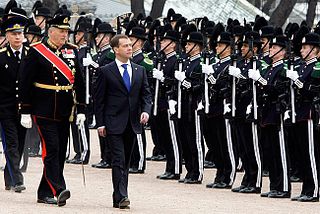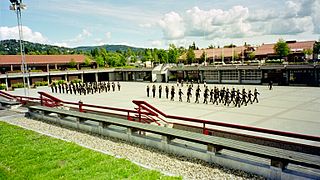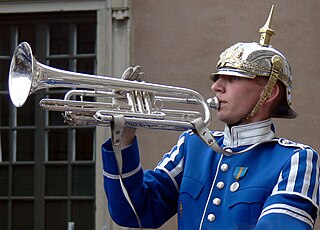
A military band is a group of personnel that performs musical duties for military functions, usually for the armed forces. A typical military band consists mostly of wind and percussion instruments. The conductor of a band commonly bears the title of bandmaster or music director. Ottoman military bands are thought to be the oldest variety of military marching bands in the world, dating from the 13th century.

The Norwegian Army is the land warfare service branch of the Norwegian Armed Forces. The Army is the oldest of the Norwegian service branches, established as a modern military organization under the command of the King of Norway in 1628. The Army participated in various continental wars during the 17th, 18th, and 19th centuries as well, both in Norway and abroad, especially in World War II (1939–1945). It constitutes part of the Norwegian military contribution as a charter member of the North Atlantic Treaty Organization (NATO) since 1949.

His Majesty The King's Guard is a royal guard battalion of the Norwegian Army. The battalion has two main roles; it serves as the Norwegian King's bodyguards, guarding the royal residences in Oslo, and is also the main infantry unit responsible for the defence of Oslo. The HMKG is located in Huseby leir in Oslo. Huseby leir is located on the old Oslo farm Nordre Huseby gård, which was acquired by the Norwegian government in the late 19th century.

In some militaries, foot guards are senior infantry regiments. Foot guards are commonly responsible for guarding royal families or other state leaders, and they also often perform ceremonial duties accordingly, but at the same time are combat soldiers.

The Norwegian Armed Forces is the military organization responsible for the defence of Norway. It consists of five branches, the Norwegian Army, the Royal Norwegian Navy, which includes the Coast Guard, the Royal Norwegian Air Force, the Home Guard, and Norwegian Cyber Defence Force as well as several joint departments.

A drill team can be one of four different entities:
- A military drill team is a marching unit that performs routines based on military foot or exhibition drills. Military drill teams perform either armed or unarmed.
- A dance drill team creates routines based on precision dance movements rather than military drill. These teams usually do not carry anything, but may use props in field production numbers. They may perform to recorded music, or the live music of an accompanying marching band.
- A team that execute routines carrying either one or multiple flags or pom-poms. This team's movements are also based in dance and may also have a heavy influence of gymnastics as well. These teams also may perform to music, either live or recorded.
- A team that is mounted or advances some type of mobile object. May also include teams of dogs and handlers.

The Royal Edinburgh Military Tattoo is an annual series of military tattoos performed by British Armed Forces, Commonwealth and international military bands, and artistic performance teams on the Esplanade of Edinburgh Castle in the capital of Scotland. The event is held each August as one of the Edinburgh Festivals.

A royal guard or the palace guard, is a group of military bodyguards, soldiers or armed retainers responsible for the protection of a royal family member, such as a king or queen, or prince or princess. They often are an elite unit of the regular armed forces, or are designated as such, and may maintain special rights or privileges.

United States military bands include musical ensembles maintained by the United States Army, United States Marine Corps, United States Navy, United States Air Force, and United States Coast Guard. More broadly, they can also include musical ensembles of other federal and state uniformed services, including the Public Health Service and NOAA Corps, the state defense forces, and the senior military colleges.

Major General Sir Nils Olav III, Baron of the Bouvet Islands is a king penguin who resides in Edinburgh Zoo, Scotland. He is the mascot and colonel-in-chief of the Norwegian King's Guard. The name 'Nils Olav' and associated ranks have been passed down through three king penguins since 1972, the current holder being Nils Olav III.

Huseby Leir is the base of the Norwegian Hans Majestet Kongens Garde (HMKG) . Huseby Leir is located on the old Oslo farm, Nordre Huseby gård, which was acquired by the Norwegian government in the late 19th century.

A corps of drums, sometimes known as a fife and drum corps or simply field music, is a traditional European military music formation. Historically, a Corps of Drums' primary role was communication. Today, the primary role of a Corps of Drums is ceremonial, performing in parades and military ceremonies. Besides drums, this formation may contain a variety of instruments, including trumpets, bugles, and fifes.

The Structure of the Norwegian Army has seen considerable change over the years. In 2009, the Army introduced the new command and control organization. As of June 2021 the army is organized as follows:

Canadian military bands are a group of personnel in the Canadian Armed Forces (CAF) that performs musical duties for military functions. Military bands form a part of the Music Branch of the CAF, composed of six full-time professional Regular Force bands, 15 Regular Force voluntary bands, and 53 part-time reserve force bands. Bands of the Music Branch are often badged with the unit or Canadian Forces base insignia that they support.

The Swedish Armed Forces Music Corps heads all bands of the Swedish Armed Forces: the Royal Swedish Army Band, the Life Guards' Dragoon Music Corps and the Royal Swedish Navy Band in Karlskrona and the 25 bands of the Home Guard. Försvarsmusiken serves the Royal Court, Armed Forces and the Government.
The Norwegian Military Tattoo is a military festival held biannually in the Norwegian capital of Oslo. It is organized by the Forsvarets musikk, the department that oversees all the country's military bands (musikkorps). The first tattoo was held in 1994 in Hamar, which is north of Oslo. The tattoo has been held in the Oslo Spektrum since 1996. It features military bands and drill teams of the Norwegian Armed Forces as well as the bands and drill teams of foreign countries.

The Musical Unit of the Spanish Royal Guard is the official music service of the Spanish Royal Guard of the Spanish Armed Forces that is dedicated to providing ceremonial honours and music to the King of Spain, the Spanish Royal Family, and public officials. The musical unit is one of many battalion sized units in the regiment, with over 100 professional musicians in its ranks who are chosen from the non-commissioned officers of the Military Music Corps. It is one of the more senior and representative bands in the Spanish Armed Forces, with its repertoire covering a wide range of Army, Navy and Air Force music. The entire unit is currently under the baton of the conductor of the Military Band of the Royal Guard, Colonel Musician Enrique Damián Blasco Cebolla.

The Royal Life Guards Music Band is the foremost military band in the Danish Defence and the official regimental band of the Danish Royal Life Guards. The DKLM is based in Copenhagen and primarily participates in parades and ceremonies for the Danish monarch and the Danish royal family. It also supports the government and the military, specifically increasing the esprit de corps in army units as well as in the public.

Forsvarets Musikk (FMUS) (English: Defence Music) is the department that oversee all the military bands (musikkorps) of the Norwegian Armed Forces (Forsvarets). Being the organizational body of military bands, it is based in Oslo, the national capital.

Hemvärnsmusiken is a division of the Home Guard that heads all 25 bands. It is led by the Home Guard's central music council and performs at 600-700 events each year. There are over 1,000 active musicians in the division. 17 bands are qualified for performance at state ceremonies, royal visits and festivities. Aside from the official bands, Home Guard Bugle Bands also are in service within their respective areas.


























